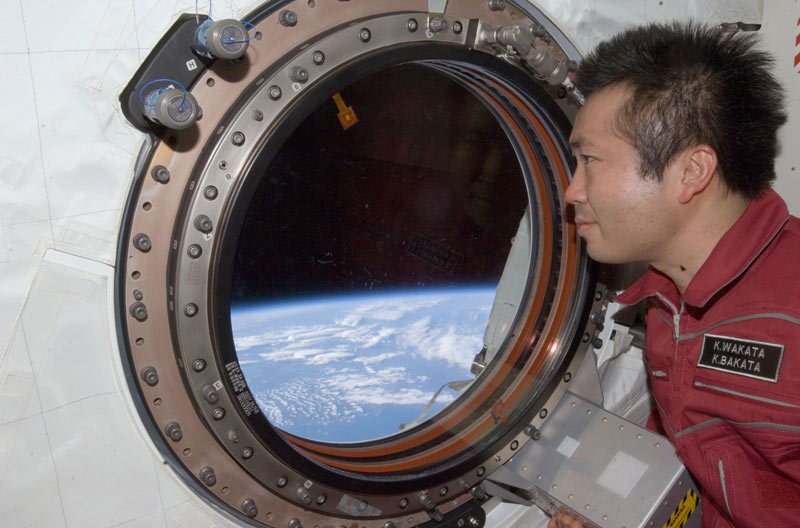Japanese Astronaut Craves Sushi

After morethan four months in space, Japanese astronaut Koichi Wakata is eagerly lookingforward to the taste of fresh sushi and other comfort foods when he returns toEarth Friday aboard the shuttle Endeavour.
Wakata, 45,has been living aboard the International Space Station as Japan?s firstlong-term resident of the orbital laboratory. He and six other astronautsare due to land in Florida tomorrow to wrap up a marathon16-day flight aboard the shuttle Endeavour.
But forWakata, who launched to the station aboard a different shuttle in March, it?sbeen 4 1/2 months since he tasted any kindof fresh food, let alone his favorites.
?I?d liketo eat sushi and cold noodles,? he told reporters before Endeavour left the stationon Tuesday. There?s no shower or bath on the station either, so Wakata said he?salso looking forward to taking a dip in a hot springs after returning toEarth.
A native ofSaitoma, Japan, Wakata is the first astronaut from the Japan AerospaceExploration Agency (JAXA) to spend months living aboard the station and formedpart of the outpost?s first full six-person crew. He is wrapping up hissecond spaceflight and did take a taste of home with him for the long trip,even if he had leave his beloved sushi on Earth.
?I was veryfortunate to bring 28 JAXA provided foods with me,? Wakata said of his Japanesespace food - which included salmon rice balls, curries and three types ofnoodles. ?That was a very big psychological support for me.?
Wakata?sstay in space was extended by a month due to delays launching Endeavour towardthe space station. He was replaced by NASA astronaut Tim Kopra, who remainedbehind when the shuttle left the orbiting lab and will return toEarth during NASA?s next shuttle flight.
Get the Space.com Newsletter
Breaking space news, the latest updates on rocket launches, skywatching events and more!
Realscience, wacky experiments
During hisflight, Wakata watched over Japan?s gleaming $1 billion Kibo module, a giantlaboratory the size of a tour bus that has its own attic-like storage room androbotic arm. He also helped outfit the lab?snew porch, which Endeavour astronauts delivered during their mission.
But some ofWakata?s experiments were less formal. As part of a program to reach out toJapan?s public, he performed a number of tests to demonstrate what life is likein space.
Among therequests: show how astronauts fold clothes, shoot water guns, put in eye dropsand ride a ?flying carpet? in the weightlessness of space. He also tried hishand at traditional Japanese radio gymnastics, and spent much of his timewearing specially tailored ?J-wear? - space underwear engineered not to smell.
?In thelast two months, I was wearing this underwear and there was no smell, andnobody complained about it,? Wakata said in a televised interview. ?So I thinkthis new J-wear is very good for myself and my colleagues.?
Mission Control woke Wakata and his shuttle crewmates this morning at 2:02 a.m. EDT (0602 GMT) with the song "I Got You Babe" by Sonny and Cher, a tune specially selected for the Japanese astronaut.
Thank you very much and it is another wonderful day in space," Wakata said.
Gravity?sheavy embrace
Afterliving in weightlessness for months, Wakata said he?s confident in his body?sreadiness to once more feel the tug of Earth?s gravity. To ease thattransition, astronauts will set up a special recumbent seat on Endeavour?smiddeck that will allow him to return to Earth in a reclined position, ratherthan an upright seat.
NASAofficials said Wakata earned a reputation for fixing broken exercise equipmentduring his flight. Wakata added that he?s worked hard to stayin good shape while in space.
?I havebeen eating regularly and exercising,? Wakata said during the flight. ?I feelvery fit.?
Wakata andhis crewmates plan to deploy a pair of small satellites from Endeavour?spayload bay today as well as check the shuttle?s flight control systems inpreparation for its planned landing on Friday. The astronauts performed five challenging spacewalks to install theKibo lab?s new porch, replace solar array batteries and deliver vital spare parts during their 11-day stay atthe station.
Wakata saidhe will miss life aboard space station and inside Kibo, but is looking forwardto seeing Earth up close again, as well as his wife and son. The sight of theplanet from orbit, he said, is one he will never forget.
?I havenever tired of seeing or watching the Earth,? Wakata said. ?We have to protectour environment.?
- Video - The Kibo Lab: Japan's Hope in Space - Part 1, Part 2
- Japanese Space Food a Hit in Orbit
- Video - Japan?s Kibo Lab Opens at Space Station
SPACE.comis providing continuous coverage of STS-127 with reporter Clara Moskowitz andsenior editor Tariq Malik in New York. Click here for missionupdates and SPACE.com's live NASA TV video feed.
Join our Space Forums to keep talking space on the latest missions, night sky and more! And if you have a news tip, correction or comment, let us know at: community@space.com.

Tariq is the Editor-in-Chief of Space.com and joined the team in 2001, first as an intern and staff writer, and later as an editor. He covers human spaceflight, exploration and space science, as well as skywatching and entertainment. He became Space.com's Managing Editor in 2009 and Editor-in-Chief in 2019. Before joining Space.com, Tariq was a staff reporter for The Los Angeles Times covering education and city beats in La Habra, Fullerton and Huntington Beach. In October 2022, Tariq received the Harry Kolcum Award for excellence in space reporting from the National Space Club Florida Committee. He is also an Eagle Scout (yes, he has the Space Exploration merit badge) and went to Space Camp four times as a kid and a fifth time as an adult. He has journalism degrees from the University of Southern California and New York University. You can find Tariq at Space.com and as the co-host to the This Week In Space podcast with space historian Rod Pyle on the TWiT network. To see his latest project, you can follow Tariq on Twitter @tariqjmalik.